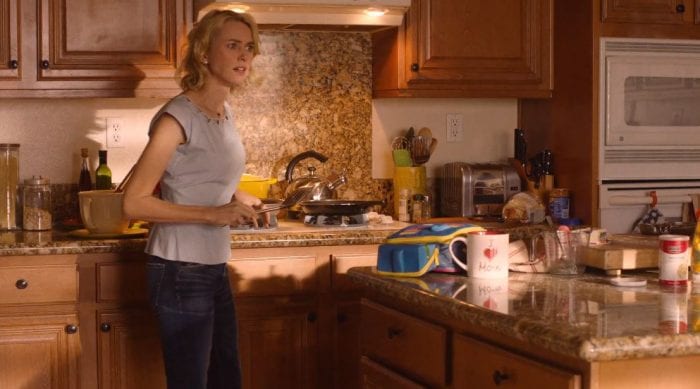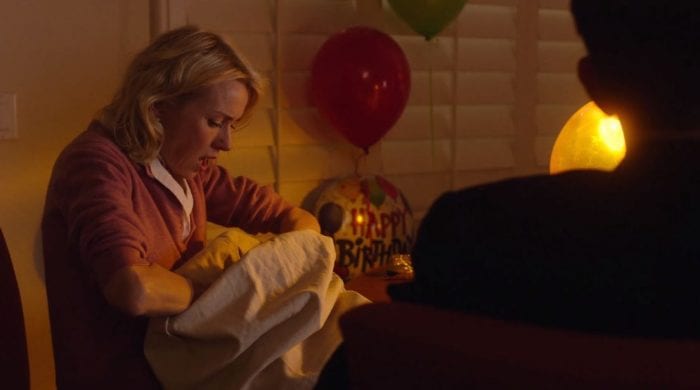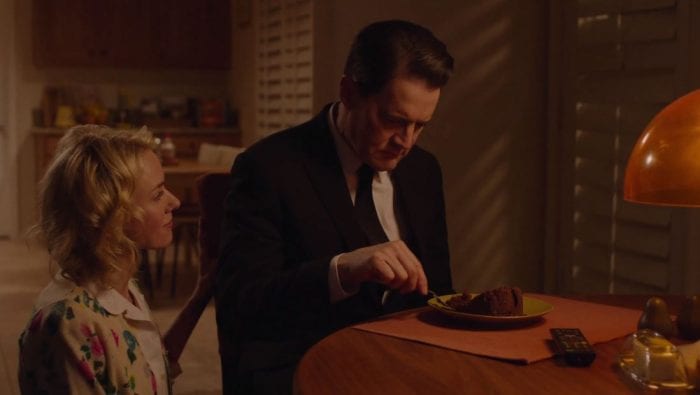With our Celebration of Women articles, it’s time to let the dreamer sleep and focus on the dreamy. Janey-E is an essential character in understanding the breadth of Twin Peaks: The Return with its range of statements and impact. That is to say that audiences shouldn’t miss the series’ possible statements on women, gender, and society, not simply in postwar America—1945-1960, as framed in Meyerowitz’s book Not June Cleaver[1]—but also post-2008 recession America as emphasized through Janey-E’s character. There is a nuclear family forgery behind the red door on Lancelot Court in Las Vegas. The mother of that forgery is Janey-E. She is Diane’s half-sister (the tulpa’s, anyhow), mother of Sonny Jim, and wife of Dougie Jones (before Cooper), but Janey-E is not real. She is only as real as a tulpa, yet serving the same function as Martha and George’s Sonny Jim (non-exist-ent) in Who’s Afraid of Virginia Woolf? (play 1962, film 1966).
She is also June Cleaver[2] in modern America, and she is frustrated at the challenges in fulfilling that role, given the environment she finds herself in. Regardless of her origins, she is angry that her husband, Dougie, is failing in his duties to their marriage and family—instead of earning, he’s gambling; instead of loyalty, he’s cheating; instead of achieving, they still have an old car. Yet, she cannot exist without him—without a carbon copy husband, without a carbon copy child, without a carbon copy Diane. Everything about the Joneses exists as functional tulpas. Therein is a complication in the text worth noting. Where is Janey-E’s autonomy as a woman, or her own social agency? Some will immediately jump to her agency in the park with the thugs, and that will be addressed.

In a dissertation titled “Escaping June Cleaver: The Domestication of Women Through Advertising,” author Allison Hawn frames Leave It to Beaver’s matriarch, June Cleaver, as “The demure wife to working man Ward Cleaver, June prepared dinner, kept her house spick and span, and doted on her children as she sashayed in her conservative floral dress into the lives of the American public from 1957 until 1963.”[3] Part 8 of The Return frames the postwar, post-atomic testing implications as being important to the analysis of the show. It’s not just an origin for the series’ evil, it’s a context for everything after, including social roles and expectations, and it is a context that David Lynch has been exposing in a transgressive manner since Henry’s pressure from societal norms in Eraserhead as well as the dark secrets underground and behind closed doors in Blue Velvet. He believes his fondly-remembered childhood exemplifies these norms. Note the following detail of Lynch’s own parental role models from Room to Dream.
Lynch’s childhood friend Gordon Templeton remembered Lynch’s mother as “a great homemaker. She made clothes for her kids and was quite a seamstress.” Lynch’s parents were romantic with each other, too—“they’d hold hands and kiss each other goodbye,” said Martha Levacy—and in signing correspondence Lynch’s mother sometimes wrote “Sunny,” and drew a sun next to her name, and “Don,” with a drawing of a tree next to his. They were devout Presbyterians. “That was an important part of our upbringing,” said John Lynch, “and we went to Sunday school.”[4]
In the early seasons of Twin Peaks, characters can feel like 1950s and 60s’ James Deans and Peggy Sues thrust out of time into the 1990s. If Dougie’s hair in Part 3 is any indication, the Jones’ are from the 1960s or 70s injected into the 2010s. It is also well-known that David Lynch is a fan of AMC’s Mad Men. Perhaps more than June Cleaver, Janey-E (the E was a clue to Evans, as in Diane Evans, like a letter beneath a fingernail) is closer to a middle-class Betty Draper or Trudy Campbell, but the domesticated expectations, perhaps even desires, remain.
Nuclear Family Normalcy
One of the difficult tasks in writing about Janey-E is to not to let the material devolve or detour into a discussion of Dougie or Sonny Jim, though the decoration of Sonny Jim’s bedroom might be worth noting for her situation (the 50s/60s-esque cowboys and Native Americans wallpaper and Hardy Boys books). So, it’s best to start with some of her traits. One of the earliest evident traits with Janey-E is her willingness to look past her husband’s misdeeds, even his sudden and confusing transformation, to hold onto what she has. She is fighting a lone battle for the June Cleaver context of normalcy, to keep her nuclear family intact. The advantageous arrival of Cooper in her deadbeat husband’s place and the luck he brings them in material wealth brings out her second trait, materialism. But there is an important aspect to these traits—it is not simply that she will not allow herself to become a “displaced homemaker”[5]—they are survival mechanisms, not just per her social identity but for her own literal existence.
Upon first considering the character, my inclination was perhaps misguided epiphany: Janey-E is the only woman that Cooper has truly saved. It made so much sense—now she has a new car, she has a husband who fulfills his duties, her son is happy and pleased with his new gym set, her sex life is back to satisfying, and finally, someone is finishing all of that chocolate cake! But then, we must talk about so much uneaten chocolate cake and the birthday balloons slowly deflating when Cooper arrives at the red door on Lancelot Court. When Janey-E first sees her supposed Dougie, she is furious. He has been missing three days. He has missed Sonny Jim’s birthday, but has he? In the following, I am going to speak a bit to Sonny Jim as a context for all the Joneses and what Janey-E is both fighting for and requiring for existence herself.

First, the house is not in disarray when Cooper arrives. Yes, there are birthday balloons everywhere, but the floors, counters, and table are pristine. There is no Sonny Jim waking at Janey-E’s frustrated conversation or “Dougie’s” return home after three days. Upon “Dougie” coming home, he comes bearing his Mr. Jackpots’ thousands and thousands of dollars. This, Janey-E can work with; this money will pay off their bookie debts (only what they deserve—this family has paid enough already), and this secures the nuclear family against any more deviations from the norm. She is up to the task of achieving and defending this normalcy against the police and against cheap gangsters. Once she realizes her family’s newly gained advantage against Dougie’s affairs, addictions, and offenses—I would like to assert that she blames all of that on stresses from the recession—she immediately can fall back into maintaining domesticated normalcy. She first offers to make him a sandwich and then gets him a piece of Sonny Jim’s chocolate cake, because they saved him a piece (he’ll be eating this chocolate cake until his coma in Part 15).
Cooper will not meet silent but giggly Sonny Jim until the morning, until Janey-E has projected his existence to him. Now, we must look at Sonny Jim more closely to understand Janey-E. This gets us to Who’s Afraid of Virginia Woolf? (spoilers for those of you who have not read or seen it acted out). I would summarize it myself, but Bruhm has already done so in his article “Things to Do with Your Imaginary Child.”
As the play unfolds, we learn that Jim is imaginary, a fantasy that George and Martha have shared privately for years. Introduced into the conversation against George’s wishes, Jim is then “killed off” by George—against Martha’s wishes—in a seeming attack on both his wife and his guests, as well as on Jim himself.[6]
It is certain that Sonny Jim is referenced here, which I am aware has been highlighted by many since that time, but acknowledging it includes recognizing that it is guiding an important reading. While references to One-Eyed Jacks in the early seasons of Twin Peaks may have simply been an Easter egg reference to the John Wayne film (admittedly, not all references need be more than that), it can imply a reading of double-crossing. With Sonny Jim, it can also lead us to a reading wherein we recognize that Janey-E has been dropped into this world needing to believe she has a perfect nuclear family, that they are real in this unreal world. Remember, we do not know when her fingerprints first appear in government databases. She needs to believe her son is real, that her husband is real. But where does this need come from in a family, if not Lodge shenanigans? As Bruhm again points out:
“For Davis, Who’s Afraid of Virginia Woolf? stages the imaginary child as a conflict between Martha’s desire for a libidinally rich domestic economy that includes her husband, her father, herself, and their “son”; Jim exists for her as the guarantor of lively (even if illusory) familial relations.”[7]
I propose the same for Janey-E with the added literal implications of requiring a guarantor of existence. This might explain her fearless fight against Ike the Spike and her fearlessness against the street-level thugs at the park. She’s fighting for her life.
The Atomistic Family
So, here is an on-the-nose point to make. Given the importance of the Trinity Test and its impact on the world of Twin Peaks and Janey-E’s narrative, easy word associations include nuclear (nuclear family, of course) and atomistic family. Let me explain this notion of atomistic family and then see if there is an application for our scenario with Janey-E and Joneses; yes, we’re trying to keep up with the Joneses. First written about by Carle Zimmerman in 1935, the idea is as such. The family has lost its control of the individual, its ability or willingness to do so, and likewise, the individual to sacrifice for the unit. This leads to a breakdown: “desertions, divorces, juvenile delinquencies, the increased dependency of individuals upon public relief, the decay of former sex mores, and the inability of larger and larger portions of the social system, keyed to family life, to function at all well.”[8] This washes out in a further quote by Zimmerman.
It is an idea that the great society is, in the long run, conditioned by the nature of the smallest natural unit of social relations. If the molecule is not strong, the larger mass has an inherent weakness … as the family is, eventually so is the society.[9]
If this atomistic theory applies to the Joneses, it may very well support the idea that Janey-E is a White Lodge molecule—this is her agency in the world of Twin Peaks—against Mr. C’s Dougie tulpa, who was clearly created off of the negative portion of Cooper. Being a particularly charged molecule, perhaps she did have the ability to present a Sonny Jim tulpa into their lives. Once Cooper replaces Dougie, a scheme is at play. The atomistic family molecule, this nuclear family, becomes stronger, and they must fortify themselves against a weakened society. In Twin Peaks, we see the true impact of dysfunctional families. Truman and his wife are fraught with the post-traumatic stress of their son’s wartime death. Shelley and Bobby are divorced, and their daughter, Becky, is in a drug-addled, abusive relationship. Andy and Lucy’s son, Wally Brando—as The Diane Podcast has pointed out—is estranged from them and the town, giving them permission to make his home unfamiliar to him, to make it not his own. Ed and Norma, while reconciled by the show’s end must settle for their friends as family, being too old to have kids. Then, closer to home, the woman yelling “119!” in the Rancho Rosa district house on Sycamore St. and her child are the very doppelganger versions of Janey-E and Sonny Jim. Dougie exits our world there as if Rancho Rosa is the Deer Meadow to Lancelot Court. The child’s hair is unkempt, and he lacks love or noticeable belief in his existence; she’s on drugs, and the house is in ruins with no food in the fridge. There is only one birthday balloon in this home, and it is deflated to the floor. As the Josephine Premice song says: “Don’t mess around you dopes, lay off the isotopes.” When the atomistic family is weakened, society is weakened—this is Janey-E’s agency regarding society at large, a charge against the Black Lodge’s weakened portions—correctly leading us to Janey-E’s speech to the thugs in the park.
Janey-E Jones: Now let’s get to it. Explain to me exactly what Dougie did to make him owe you money.
Jimmy: He borrowed it.
Janey-E Jones: What do you mean, “he borrowed it”?
Tommy: He took points on a football game. He got greedy, he doubled down. It didn’t work out for him. Out 20 grand he was, plus interest. Now, that was three weeks ago.
Jimmy: Meter’s still running. It’s up to 52.
Janey-E Jones: So let me get this straight. People were playing games. He made a bet where he lost $20,000. But you want him to pay you back $52,000?
Tommy: Very good. That’s correct.
Janie-E Jones: Okay, so you get this straight. My husband has a job, he has a wife, he has a child, he does not make enough money to pay back $52,000 for anything. We are not wealthy people. We drive cheap, terrible cars. We are the 99 percenters. And we are shit on enough, and we are certainly not gonna be shit on by the likes of you.
Jimmy: Nevertheless, lady…
Janey-E Jones: So here’s what we’re gonna do. Without my knowledge, my husband came to you for a loan of $20,000. You were nice enough to give it to him. But he should never have been gambling like that. I’m gonna pay you back. Now, at my bank, where we make less than one percent interest on what little money we have, people would be turning cartwheels just to get 25 percent interest on any loan, and that is what I’m generously gonna give to you right now, $25,000. That is my first, last, and only offer to you. What kind of world are we living in where people can behave like this? Treat other people this way without any compassion or feeling for their suffering? We are living in a dark, dark age, and you are part of the problem. Now, I suggest you take a good, long look at yourselves because I never want to see either of you again.[she leaves]
Jimmy: Tough dame.
Tommy: Tough.[10]

A Final Piece of Cake
Janey-E is confronting the weakened state of society head-on. This makes it all the more imperative that the Joneses as a sitcom nuclear family must prove out. It is a task set upon Janey-E to instill in a reborn Cooper a traditional family role. He must go to work and see their child to bed. He will require sandwiches and chocolate cake (if this life is unreal, they will will it into being, a tulpa life). As Cooper fulfills his role more and more, coming more and more to the surface, the blessings of an improved society due to his traditional goodness increase the energy about his family. One night, while Janey-E dutifully washes the dishes, and her black-suited husband sits with his dessert, their nuclear family fully functional, a world in need calls back to him. With an electrical shock, the tulpa family is made manifest. That’s what I am suggesting for Janey-E. I believe Janey-E succeeds as a sitcom family mother and in providing that stability for Cooper against a corrupted world full of weakened families, she is rewarded with Cooper’s return. In turn, a real, talking Sonny Jim is made manifest, and Dougie is coming home to one of America’s best television mothers.
[1] Meyerowitz, Joanne J. Not June Cleaver : Women and Gender in Postwar America, 1945-1960. Critical Perspectives on the past. Temple University Press, 1994.
[2] June Cleaver is a fictional character and mother on the television series Leave It to Beaver: https://en.wikipedia.org/wiki/June_Cleaver
[3] Hawn, Allison, Mean, Lindsey, Nadesan, Majia, and Sanderson, James. Escaping June Cleaver: The Domestication of Women Through Advertising, 2017, ProQuest Dissertations and Theses, 1.
[4] Lynch, David and Kristine McKenna. Room to Dream, Random House
[5] Flaming, Anna, Kerber, Linda K., Schoen, Johanna, Baynton, Douglas, Estin, Ann, and Gordon, Colin. “The Most Important Person in the World”: The Many Meanings of the Modern American Housewife, 2013, ProQuest Dissertations and Theses, 132.
[6] Bruhm, Steven. “Things to Do with Your Imaginary Child.” Jeunesse: Young People, Texts, Cultures 9, no. 2 (2017): 23.
[7] Bruhm, p. 25
[8] Zimmerman, Carle C. “The Atomistic Family — Fact or Fiction.” Journal of Comparative Family Studies 1, no. 1 (1970): 11. http://www.jstor.org/stable/41600754.
[9] Zimmerman, p. 11-12.
[10] Transcription credit: Miller, Steve. “Janey-E Jones’ 99-Percent Monologue in the Park,” Twin Peaks Blog, December 10, 2018. Accessed 06/25/2019, https://www.twinpeaksblog.com/2018/12/10/janey-e-jones-99-percent-monologue-in-the-park/




Excellent article! I too had thought through SOME of this (particularly noting that Janey-E portrays stereotypical responses to the man–that her anger is calmed when she sees the cash and gifts he brings home, sees him in battle, sees him fit and sexual), but I had not recognized the references to other works. I noticed the owl before Janey-E’s first appearance (suggesting that she too was manufactured), but I had never thought about Who’s Afraid of Virginia Woolf, the term “nuclear” family, or numerous other details here. Thank you!!